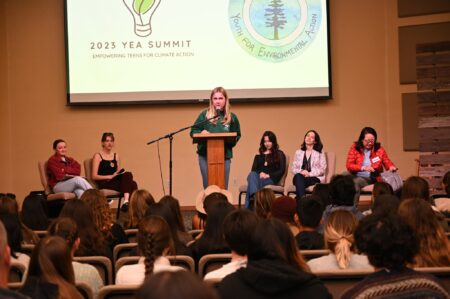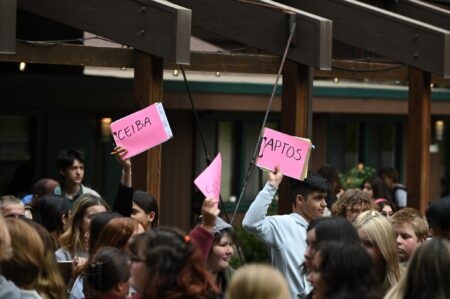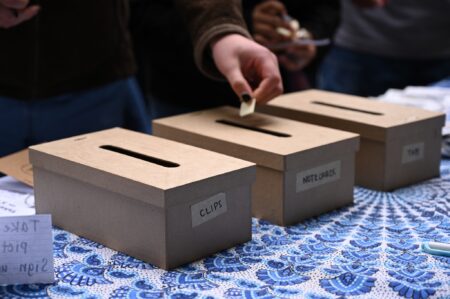By Avonlea Harwood

Monday, April 22, was a day filled with community collaboration, moving student stories, and abundant opportunities for change. Youth for Environmental Action’s 2023 Summit: Empowering Teens for Climate Action embraced communication between students and policy-makers in a unique, impactful way. We, student leaders in Youth for Environmental Action (YEA), had been anticipating seeing our work-in-progress come to life, and could not wait to observe its impact on the high schoolers from across Santa Cruz County that joined us.
The summit was held at Koinonia Conference Grounds, where about 200 attendees gathered to educate themselves and take initiative for the planet. Despite it being a cold morning, the atmosphere was filled with an eager, hopeful sense of unity.
We heard from two resilient Pajaro Valley High School teens, both of whom were displaced due to the disastrous floods in March. As they began their stories of being evicted from their homes and forced to live in the county shelter, it became potently real how climate change is accelerating and our locals are facing the brunt of it.
 One of the students bravely voiced, “We’ve been living at the Santa Cruz Fairgrounds for a month now and I’m pretty sure there’s more to come. I’m pretty sure we got really affected but it was also a life lesson that we learned we could have everything in a moment and then lose everything.”
One of the students bravely voiced, “We’ve been living at the Santa Cruz Fairgrounds for a month now and I’m pretty sure there’s more to come. I’m pretty sure we got really affected but it was also a life lesson that we learned we could have everything in a moment and then lose everything.”
The keynote panel, featuring Professor and Ecological Anthropologist, Flora Lu; Youth for Climate Justice student leader, Tamarah Minam; and Director of the Natural History Museum, Felicia Stolk, was a true highlight of the event. Tamarah’s comments uplifted the crowd, “So if we’re all able to work on smaller things … to work on curriculum and making our schools more sustainable, if we all do it together we can create change in this system and tackle this major issue.”
We then transitioned to the Community Action Fair, where the focus of the day leaped from absorbing the inspirational words of local leaders to taking the first step to change. In total, Environmental Innovations, Citizens’ Climate Lobby, the Homeless Garden Project, Seymour Marine Discovery Center, Clean Oceans International, the Bird School Project, and Regeneración had a total of 188 sign-ups for activities and volunteer opportunities.
Walking by the fair-like array of organization tablings, one would see studentsenthusiastically asking questions, suggesting ideas for community engagement, and even writing postcards to their congresspeople. Coastal cleanups were arranged, specific actions for making schools greener were discussed, and commitments to volunteer were taken. Molly Gannon from Pacific Collegiate School commented about the booths, “I thought it was really cool how there were a variety of organizations from different environmental focuses. I went to the Regeneración booth and signed up for their newsletter. They hold meetings with local politicians and advise them to improve their environmental policy in Watsonville– an important agricultural center. I also thought more about my diet after talking to the Eat for the Earth booth representatives, and I’ve been trying to eat less processed and meat-based foods. It made me want to involve myself further with local organizations, even if it’s simply attending meetings or doing a volunteer day.”

Ziggy Lukasiewicz, also from Pacific Collegiate School, added, “A big take-away from talking to all the booth organizations was that it’s inspiring to be around groups of people who are prioritizing similar things. I felt that not everyone is against the environmental movement, lots of people are pushing forward. It really reenergized me to keep fighting for the environment.”
Everyone proceeded to divide into school-based groups to brainstorm what needs to change in the school districts. The San Lorenzo Valley High School group spoke with their superintendent, resulting in a productive conversation about making board meetings more accessible for students. They plan to begin a dropbox for students to voice their concerns about school matters, and implement compost bins and use lower-footprint containers for cafeteria meals.
As the day came to an end, we closed with a speech, in which we quoted the following lines from We are the Change, a poem written by YEA member, Carolyn Randolph: “And say we stay silent? / Listen in the call of the bird, the motion of the grass, the march of the ants / Each voice avalanches forming a chant.”
Avonlea Hardwood is a YEA Student Leader and a senior at Pacific Collegiate School. The Student Voices section is authored by Santa Cruz County students. Views expressed reflect those of the post’s author, not necessarily those of the Santa Cruz County Office of Education.
